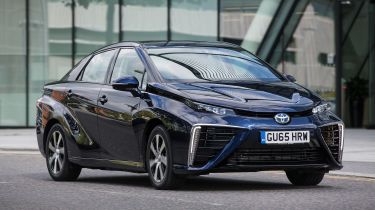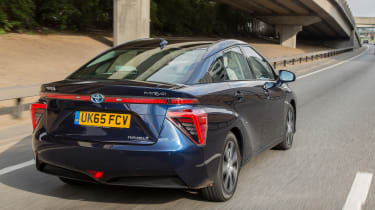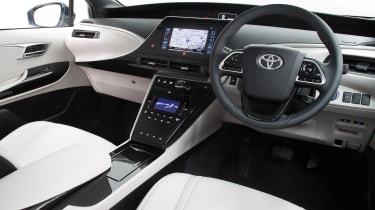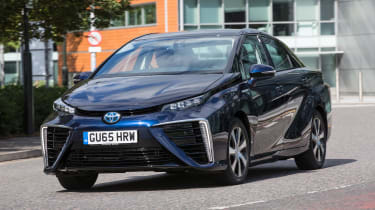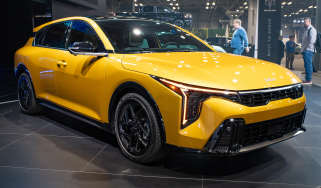New Toyota Mirai 2016 review
The Toyota Mirai runs on hydrogen and emits nothing but water, but is it really a glimpse of the future?

The Toyota Mirai is comfortable, quiet and very cheap to run. It has a long list of standard equipment, too, and the electric motor’s instant torque means it has plenty of punch for overtaking. It’s still very hard to recommend buying one, though, as there are so few filling stations that only buyers with specific circumstances will be able to run one. Even then, however, they’ll be paying for the privilege. We simply can’t recommend one yet, but we applaud Toyota for bringing the future to the market in 2016.
What's the alternative fuel of the future? Electricity seems to be the preferred choice for city commuters across the country, but Toyota thinks the future lies in hydrogen power - and now the company's released a limited number of Mirai hydrogen cars for sale in the UK.
The name 'Mirai' means future in Japanese, which should give some indication of Toyota's plans for this car. The company plans to forge ahead with alternative fuels as soon as possible. In this case it's hydrogen, which has the huge benefit of being made available at filling stations across the UK. This means that while the Mirai is driven by an electric motor, instead of a lengthy charge period you can simply top it up in a few minutes like a normal car. It's also got a far superior range to most electric cars - around 300 miles, Toyota claims.
Used - available now

2022 Nissan
Micra
22,169 milesManualPetrol1.0L
Cash £10,700
2015 Volvo
S60
78,200 milesManualPetrol1.6L
Cash £7,400
2016 Tesla
Model S
78,000 milesAutomaticElectric
Cash £18,999
2019 Nissan
Micra
17,450 milesAutomaticPetrol1.0L
Cash £13,199• Can you really live with a hydrogen fuel cell car?
The fuel cell itself generates electricity by mixing hydrogen with oxygen, storing it in a battery and powering the motor just like any other Toyota hybrid. That means the only emission from the tailpipe is pure water. It periodically purges H2O from the system, and there’s even a button on the dash to get rid of it when you choose – to make sure it doesn’t drop out just as you pull into the garage at home.
The Mirai is a four-seater saloon that sizes up with the likes of VW’s Passat or the Ford Mondeo. That means the engineers had to work harder to get the complex components to fit, rather than adding them to an SUV – like the Hyundai ix35 FCV – where there’s more space to work with.
The electric motor provides 152bhp and 335Nm of torque, but the bulky batteries, fuel cell and motor mean it weighs around 1,850kg. That translates to a 0-62mph time of 9.6 seconds and a top seed of 111mph. But don’t be fooled by the figures; the Mirai’s instant torque off the line means it feels more than fast enough.
• Best electric cars on sale now
The weight is a problem in corners, however, where the Mirai feels rather hefty. It isn't bad to drive, but the hydrogen Toyota is better suited to town and motorway journeys than it is a twisting country road. The soft suspension shows its best side on a more relaxed route.
Ride quality is very good, and potholes and only the worst speed bumps manage to upset the car. There’s little wind and road noise and only the faintest of noises from the fuel cell, which makes the cabin very hushed.
The seats are comfortable too, and all four occupants get the same treatment. All the seats are heated, and as there’s no middle seat in the back the rear passengers will be able to get comfortable easily. Practicality isn’t bad, though the 361-litre boot is some way off the Passat’s 586-litre load bay.
Up front, the steering wheel, dashboard and centre console unit all feel well built, but the touch interface and small buttons are fiddly to use on the move. We’d prefer a more logical interface, but in all honesty it’s a very small niggle.
That said, the biggest problem comes when you consider the Mirai’s rivals. Just about every car of around the same size is much cheaper to buy than the Toyota, which has a list price of £66,000. That’s more than double what you’ll pay for rival cars, which makes any savings on running costs almost negligible. If your buying decision is all about the bottom line then it’s impossible to recommend such an expensive car, although a proposed (but not confirmed) Government grant could reduce that price by several thousand pounds.
You can use Toyota’s £750 contract hire program, which lasts for four years and 60,000 miles and includes maintenance, tyres and fuel (up to about £200/month). You also get a five-year warranty, plus a concierge service and roadside assistance.
That could come in handy for the early adopters, since there are currently only a few hydrogen fillings stations – so if you find yourself running out of fuel in a remote area then there’s not a lot you can do. The system is pressurised as well, so you’re unable to just refill it with a jerry can at the side of the road.
Even those buying for the green credentials might have to think twice. Currently most hydrogen fuel is produced using fossil fuels, which makes the water-only tailpipe claim somewhat questionable.

